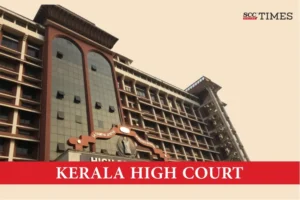Kerala High Court: In a set of two writ appeals filed against the stay of recovery proceedings against the Edamulackal Service Co-Operative Bank (‘the Society’) in a fraud case, the division bench of Amit Rawal* and K.V. Jayakumar, JJ., held that it is a clear case of breach of trust and cheating and directed the ED to initiate probe against the Society. The Court also directed the Society to release funds to all the appellants.
Background
The appellant is a cancer patient who had deposited money in the Co-operative Society called Edamulackal Service Co-Operative Bank Ltd (‘the Society’) which was running the business of granting 2% extra interest than the bank rate. From 2009 to 2017, the elected members of the Society were negligent in discharging their duties resulting in a substantial loss. Under Section 68(2) of the Kerala Co-operative Societies Act, 1969 (‘the Act’), surcharge proceedings were initiated wherein a liability of Rs. 24, 44, 95, 724 was imposed upon 14 persons.
In the last order dated 03-12-2024, this Court had noted that it is a classic case of aggrandizement at the level of the erstwhile committee of the society, who had squandered and played with the money of the depositors, who are being deprived of the fruit of their deposits. Out of many depositors, few of them are facing not only financial hardship but medical difficulties like cancer and other diseases. Thus, the Court directed the Registrar of Co-Operative Societies (‘the Registrar’) to provide details of the FIR registered and of the surcharge proceedings initiated against society members.
The Court also noted that it is not yet deciphered as to how the siphoned-off money prima facie has been parked outside India and the Court has also not been informed of the reason for non-initiation of proceedings against the members under the Prevention of Money Laundering Act, 2002 (‘PMLA’) despite there being a predicate offence. Noting this, the Court suo motu impleaded the Enforcement Directorate(‘ED’).
Analysis
The Court noted that an FIR was registered against a former Secretary under Sections 406, 409, and 420 of the Penal Code, 1860 (‘IPC’), wherein an investigation is pending but the stage of investigation is unknown. Thereafter, at the instance of one of the depositors, another FIR was registered under Section 120 of IPC against three accused, including the above-stated former Secretary and the Acting Secretary. These two complaints were clubbed.
Noting the aforesaid, the Court stated that since initially the FIR was only registered against the Secretary, it is intriguing as to how and in what manner the other surcharge persons were let off with no criminal case. Thus, the Court directed the Home Secretary and Additional Chief Secretary, Co-operative Societies to explain, by way of an affidavit, the circumstances and the reasons for not registering the FIR against the other person despite the settled law that both criminal and civil proceedings for recovery can go side by side.
The Court directed them to mention whether, on registration of the FIR, the accused persons have been arrested, released on bail or not or otherwise as well as disclose the steps taken by the Government to ascertain the assets, both movable and immovable, of all the surcharge persons in the affidavit. Till such assertation is done, the Court restrained the surcharged persons from creating third-party rights, and alienation of the movable and immovable assets.
Noting that this is prima facie a case of breach of trust and cheating, which is a predicate offence under Section 3 of the PMLA, the Court directed the ED to register an Enforcement Case Information Report (‘ECIR’) against all the persons involved, for misappropriation, breach of trust, cheating as well as offences under the Prevention of Corruption Act, 1988. The Court also directed the ED to file an affidavit regarding the steps taken after registration of the ECIR before the next date of hearing.
The Court noted that the Single Judge had directed the Society to apply for financial assistance under the Government revival scheme called Kerala Co-operative Revival Fund Scheme, 2024. However, despite the direction, the Society had neither submitted any scheme for revival nor an application for financial assistance. Thus, the Court directed the Society to apply for it.
Regarding the issue of maintainability, the Court stated that as per Kerala Co-operative Ombudsman Scheme, 2010, any person aggrieved for non-deposit of the amount is entitled to approach the Ombudsman. In both aforementioned cases, the Ombudsman has passed the orders, and as per the amended provisions of Section 76 of the Act, these orders are executable under the Revenue Recovery Act, 1890 (‘the RR Act’).
The Court further noted that when the recovery proceedings were initiated, the District Collector referred the matter to the Joint Registrar who has no authority under the RR Act to take steps for recovery. Noting this, the Court directed the District Collector to give reasons via an affidavit for not entertaining the execution petition in the manner and mode prescribed under the statute.
The Court noted the medical and financial condition of the appellant as well as the contention that the matured amount according to his calculation is about Rs.9,40,000 and Rs.56,370 in the Savings Bank Account. Further noting that since the Society has a deposit of Rs.1,50,00,000, the Court directed it to immediately pay the appellant.
Regarding the five other appellants, the Court directed the Society to release 50% of the outstanding amount to four of the appellants and a sum of Rs.10,00,000 to the appellant to whom the amount of Rs.21,60,000 is due.
[Rajendran Unnithan. S v. Registrar of Co-Operative Societies, 2024 SCC OnLine Ker 7156, decided on 04-12-2024]
*Order authored by: Justice Amit Rawal
Advocates who appeared in this case :
For the appellant: R. Reji, Arun Bose, B. Bipin, Jeena A.V., M.V. Thamban, Thara Thamban, Thomas Thomas.
For the respondent: T.K. Vipindas, Senior Government Pleader, Santhosh Kumar, and Jaishankar V. Nair

